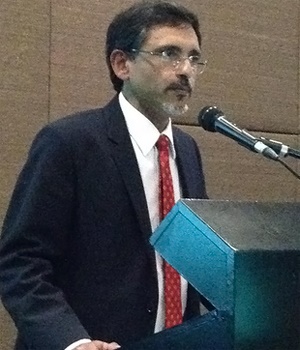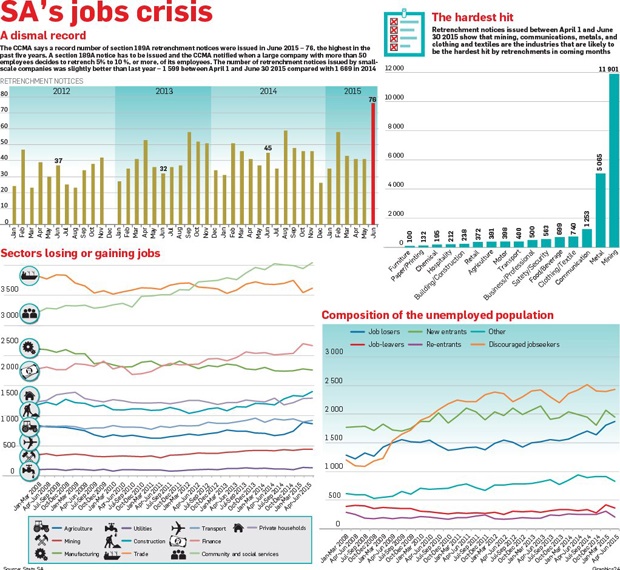
Economic Development Minister Ebrahim Patel says government has a plan to deal with the “unprecedented” employment blood bath, which since April has seen more than 23 000 South Africans receive notice that they may lose their jobs.
After a Cabinet lekgotla on Friday, Patel told City Press that government has decided that every department will create new jobs in earnest by hiring staff to work on massive infrastructure maintenance projects, such as roads, water infrastructure, schools and hospitals.
“Maintenance is your biggest job driver. You create more jobs on maintenance than on new builds. So we will still strengthen the new-build programme, but the big focus will be on maintenance,” he said.
“When you fix roads and potholes, maintain gravel roads in rural areas, ensure that road markings are constantly renewed, and that broken windows at schools and doors at hospitals are fixed quickly and efficiently, you create an enormous number of jobs.
“The focus will be on maintenance to ensure we don’t just build new infrastructure, but also save and lengthen the usable life cycle of existing infrastructure and create jobs,” Patel said.
Unprecedented retrenchments
Figures from the Commission for Conciliation, Mediation and Arbitration sent to City Press this week show that an unprecedented number of retrenchment notices were filed in June by companies with more than 50 employees – the highest number in the past five years.
Between April and June, 23 231 employees were given formal notices that they were likely to be retrenched in the next few months – more than half of these jobs (11 901) are in the mining sector.
Patel says government’s new jobs drive is part of the nine-point plan President Jacob Zuma outlined during his state of the nation address in February. It is aimed at growing jobs in mining, energy and infrastructure.
“What we are looking at is trying to increase the number of jobs on a consistent structural basis – meaning not just public employment projects, but both public and private. We’ve had some fairly significant successes,” he said.
“Since October 2010, when the New Growth Path – the economic driver of the National Development Plan – was adopted, we have had jobs growth of about 2 million new jobs.”
Nene tightens purse strings
However, Finance Minister Nhlanhla Nene told the ANC national executive committee (NEC) meeting last weekend that there had been no real employment gains in the country in the past seven years, and slow economic growth was not temporary, but “a new normal”.
“It is unlikely that this will improve in the medium term. This has significant social and political consequences,” he said in a presentation.
Nene also warned that if new jobs were to be created, they would have to come from the private sector.
“Public sector employment has been the main driver of formal sector job creation in the past five years. However, fiscal constraints mean this is unlikely to be sustained in the next few years,” Nene said.
Six million jobs
Earlier this week, Deputy President Cyril Ramaphosa said he was confident the ANC’s election promise of 6 million new job opportunities by 2019 was attainable.
However, Chris Malikane, a member of the National Planning Commission and associate professor of economics at Wits University, said this was a “pipe dream”.
“The deputy president is doing his job as a leader. He can’t tell the people that we are in a jobs blood bath. He will have to give confidence to the country, but he knows the truth,” he said.
Malikane painted a gloomy picture, saying the economy would not grow by more than 1.4%, and increasing lay-offs would mean even more pressure would be put on the fiscus through social grants.
Stats SA’s Quarterly Labour Force Survey, which was released on Wednesday, shows that between April and June this year, unemployment fell marginally from 26.4% to 25%.
Although proposed job cuts in mining are unlikely to substantially change these figures, the loss of 12 000 jobs will have a dramatic affect on areas such as Rustenburg and the Eastern Cape.
Mining hit hardest
“This is a blood bath of job losses in the mining industry,” said National Union of Mineworkers (NUM) spokesperson Livhuwani Mammburu.
The NUM has criticised mining companies for not following proper procedures in their rush to announce retrenchments, and called on Mineral Resources Minister Ngoako Ramatlhodi to withdraw mining licences from companies.
“I think some of the issues will definitely go to court because mining companies are not adhering to the due processes of the law,” Mammburu said.
“We feel that where a company is retrenching more than 10% of its workforce ... the department of mineral resources as a regulator must take their licence.”
Anglo American also announced the loss of 53 000 jobs worldwide in the long term. Its Kumba Iron Ore subsidiary has already announced it will close its Thabazimbi mine, which will affect 800 employees and 360 contractors.
After the NEC lekgotla, ANC secretary-general Gwede Mantashe called on mining companies to reconsider their planned retrenchments. He said CEOs’ knee-jerk reaction to retrench was both “lazy” and “unpatriotic”.
But mining companies have hit back.
Kumba Iron Ore CEO Norman Mbazima told City Press on Thursday: “Iron ore prices have moved from an average of $135 a ton in 2013 to $97 last year to $60 for the first half of this year, and we’re not expecting them to recover significantly. I think there are very, very few industries and organisations that can survive intact [with] a reduction in prices of that magnitude.
“So it’s absolutely imperative that we look at how we do business in every sense of the word if we are to become resilient at those low prices,” Mbazima said.
On Thursday, Anglo American CEO Mark Cutifani called on all parties to bridge the “trust deficit” that exists between government, the unions and the mining industry.
“Our current deep suspicion of each other is simply not sustainable,” he said.
A mining industry insider, who asked not to be named, said that, despite South Africa having one of the richest endowments of minerals in the world, investors aren’t willing to invest in new mining operations, which means that jobs lost now are unlikely to be replaced.
“The mines of the past, where the capital has been sunk – they have to make whatever sacrifices needed to be made to keep producing. But the mines of the future are never going to be built under the current regulatory environment – capital would rather go to the Democratic Republic of Congo than come to South Africa.”
In February, the annual Fraser Institute survey of the world’s most attractive mining destinations ranked South Africa a dismal 64th worldwide, and 11th in Africa.
Other jobs on the line
Although most proposed retrenchments are in mining, other sectors are also in the firing line.
On Friday, about 2 000 Telkom employees served their last day with the company after it announced in June it needed to retrench 4 400 of its 18 441 staff. For now, 2 393 employees have accepted voluntary retrenchment and early retirement packages, but Telkom said it was exploring other options, including “wage freezes, upskilling workers, shorter working weeks and flexitime” to cut costs further.
In March, SAA announced it would need to cut staff by 10% to bring financial stability to the airline.
Manufacturing has also seen the worst jobs decline since 2008 of any sector.
In April, steel maker Evraz Highveld Steel and Vanadium went into voluntary business rescue, placing the jobs of the Witbank-based company’s 2 242 employees at risk. Last week, it suspended production.
“The company has not made a profit since 2009,” CEO Johan Burger told City Press. “The low gross domestic product growth rate has resulted in lower steel demand as the mining and construction industry minimises investment.
“This low demand has been worsened by lower steel prices and the influx of cheap imports from China.”
Evraz has proposed going into “curtailed operating mode” with the view to restarting production if commodity prices improve. This could save about 1 150 jobs.
Trident Steel recently retrenched 700 employees, while ArcelorMittal’s announcement this week that it is considering closing its Vereeniging plant could mean disaster for 1 200 employees.
Little the ANC can do
For now, the head of the ANC’s economic development committee, Enoch Godongwana, said government did not have a plan that could arrest the spiralling number of job losses.
“At this juncture, there is no grand plan. This is a complex matter. To assume you can sit in a room and say ‘here is a plan’ is a mistake. That’s why I’m saying a plan must be a product of a dialogue between the different stakeholders,” he told City Press this week.
“The plan is to create the necessary framework with industry players in various sectors that will help reduce the number of jobs lost,” he said.
“The decision makers who decide who to employ are not in [the NEC lekgotla], so we will engage mining houses and relevant industries. We can’t come up with a grand plan without talking to them,” he said




 Publications
Publications
 Partners
Partners









